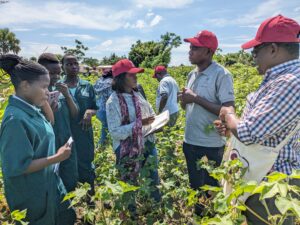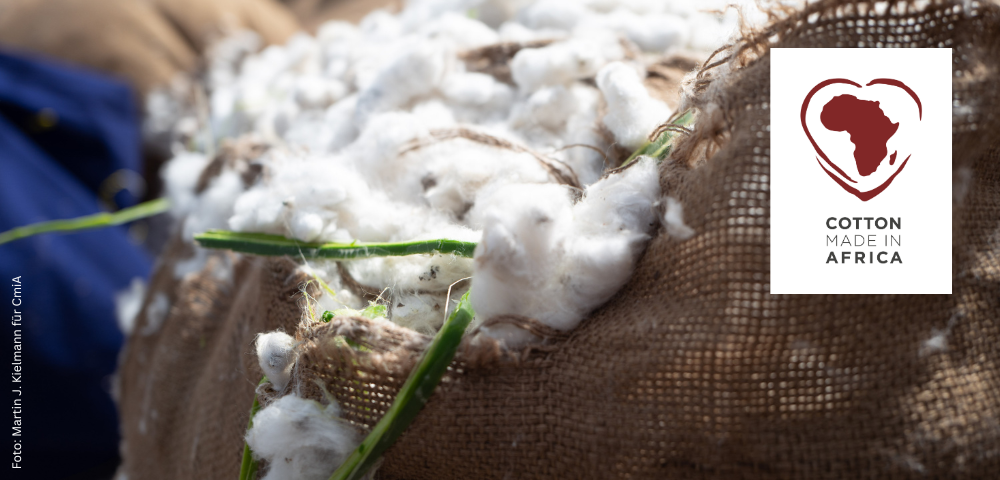– Interview with Tina Stridde, Managing Director of the Aid by Trade Foundation (AbTF) –
In an interview with the Bremen Cotton Report editorial team, Tina Stridde, Managing Director of the Aid by Trade Foundation (AbTF), reports on innovations and holistic approaches in the sustainable production of cotton and cashmere.
Bremen Cotton Report: Mrs Stridde, is there any news about AbTF that you would like to share with us? What has happened in the last few months?

Tina Stridde: Over the last few months we have been working intensively on innovative and effective instruments to improve working and living conditions in the production of cotton and cashmere, to protect our environment and biodiversity and to promote transparency in the supply chain. A key outcome of this work is the launch of our new Regenerative Cotton Standard (RCS). It focuses on increasing the resilience and productivity of smallholder cotton farming. We are creating value for farmland, rural communities, the biosphere and the quality of life for farm animals through its holistic approach. This new standard is also being implemented in India for the first time. This is a first for the Aid by Trade Foundation.
Cotton made in Africa (CmiA) has also recently joined the steering committee of the ‚Partenariat pour le Coton‘ initiative launched by the World Trade Organisation (WTO) and the International Football Federation (FIFA). The aim of this initiative is to integrate the cotton-producing countries of West Africa more closely into the global value chain for football apparel.
Despite challenging economic conditions, the foundation‘s Value to Business principle generated revenues of 8.1 million euros in 2023. AbTF used these to respond to urgent challenges in cotton farming. We increased our financial commitment to environmentally and socially sustainable raw material production by 23 percent compared to the previous year.
Our growing retail network, which now includes more than 100 retailers and brands, made a significant contribution. We welcomed new customers such as the internationally renowned IKEA and AVON, in addition to long-standing partners such as Bestseller, the Otto Group and the Rewe Group. CmiA is now active in 54 textile production markets worldwide, working with 2,700 partners in the textile supply chain and around 900,000 small farmers in 11 countries. In 2023, CmiA was the leading standard for sustainable cotton in Africa, verifying 30 percent of cotton production.
Have your priorities changed, what is the focus?
One focus is on strengthening the adaptability and resilience of agricultural systems to the impacts of climate change. Climate change, with its extreme weather events such as heavy rainfall, droughts in the rainy season, or even rain outside the usual time windows, has a direct impact on crop yields and, therefore, on farmers‘ incomes. Climate change is challenging established recommendations for good agricultural practice. In addition, there is an increase in pest pressure, as in the 2022/23 season, as well as a loss of biodiversity and soil fertility. The issues facing the cotton sector in the region are enormous.
For the cotton sector in the AbTF, what does this mean? The positives, the negatives, what is going well and what is not?

Our investments and activities focus on diversification, resource efficiency and combining traditional knowledge with innovative approaches to make farming systems more resilient. We work closely with regional and international experts, agronomists and scientists to identify the most effective and locally appropriate practices to regenerate ecosystems and help our partners stabilise yields. In addition, the AbTF focuses on technological innovation. For example, pilot projects are exploring the use of satellite data to improve farm efficiency, productivity and sustainability, or how long-term carbon storage in the soil could literally pay for itself for cotton farmers through ‚carbon projects‘.
What is your view on the German Supply Chain Act and the CSDDD in this context?
The German Supply Chain Act and the Corporate Sustainability Due Diligence Directive (CSDDD) are important steps towards greater responsibility and transparency in global supply chains. We therefore welcome these developments in principle and offer appropriate solutions for companies that are obliged to comply with human rights and environmental standards. However, we also recognise the bureaucracy involved and the significantly increased demands on textile companies.
Our standards and traceability system enable companies to respond to increasing demands from policymakers and consumers for transparency in the supply chain. Our new Chain of Custody standard, which will be implemented from 2025 and will independently verify the information in our Hard Identity Preserved Tracking System, will certainly play a special role in this. This will provide brands and retailers with full transparency of the verified raw materials they use throughout the supply chain, right up to the final product.
In this context, we take note of some of the activities of the natural fibres community in Brussels regarding forthcoming or already initiated legislation.
Natural fibres need to be valued fairly in order to realise their benefits. This is why we support the initiative ‚Make the Label Count‘, which is lobbying for natural fibres in Brussels. Our common goal is to ensure that the interests of cotton and cashmere producers are taken into account when important decisions are made in Brussels that can have a significant impact on the work and lives of producers.
Thank you very much for the interview!
The interviews in the column “Question Time“ embody the opinion of the respective interview partner and do not represent the position of the Bremen Cotton Exchange as neutral, independent institution.

